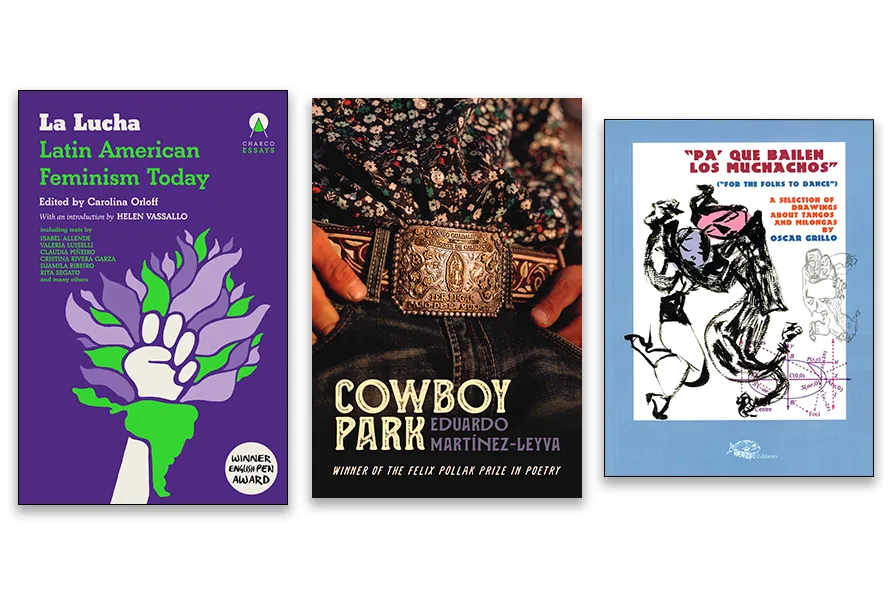SUE TURNER is fascinated by a book that researches who the largely immigrant workforce were that built the Empire State
Essays on contemporary Latin American feminism, a poetry debut by a queer Texan of Mexican heritage, and a lush volume of tango and milonga drawings


THE anthology La Lucha: Latin American Feminism Today (Charco Press, £14.99), edited by Carolina Orloff, opens with a voice that sets the tone of courage and clarity: “My name is Bertha Isabel Zuniga Caceres… I belong to the Lenca people that live in the south-west region of Honduras.”
Her mother, Berta Caceres, a formidable activist for Indigenous land and environmental rights, was brutally murdered in 2016. This tragedy, placed at the book’s threshold, becomes emblematic of the struggle that runs through all 29 essays — a struggle for land, language, and life itself.
The collection gathers luminaries such as Valeria Luiselli, Rita Segato, Diamela Eltit, Gabriela Cabezon Camara, Selva Almada, Cristina Rivera Garza, Claudia Pineiro, Isabel Allende, and Maria Moreno, among others. The result is a panoramic yet deeply personal portrait of feminism in Latin America today — intellectual, political, and fiercely defiant.
The section La Lucha Es Personal (“The struggle is personal”) is the most compelling, where the first-person testimony turns political urgency into art. Standouts include Rivera Garza’s defence of documentary writing, Pinero’s witty account of Argentina’s feminist awakening and its “feminist pills,” Garcia Robayo’s intimate reflection on being a woman writer, and Ave Barrera’s dazzling essay on women at the wheel.
Cristina Bendek’s vignettes from San Andres offer a moving chorus of island voices. Essays on Indigenous feminisms, forced motherhood, LGBTQI+ rights, and de-colonial thought complete the volume’s remarkable breadth.
This is a book to be read slowly and discussed widely — a landmark anthology that redefines feminism from the global South outward.
If La Lucha gives us a collective testimony, Eduardo Martinez-Leyva’s Cowboy Park (University of Wisconsin Press, £15) offers an equally powerful personal one. Winner of the Felix Pollak Prize in Poetry, Martinez-Leyva’s debut maps the borderlands of identity — geographic, linguistic, and erotic.
Born in El Paso to Mexican immigrant parents, the poet writes with both reverence and rage about migration, faith, and queer desire. In Sin Documentos he remembers: “Of God, we only understood His wrath, and still, we spoke about Him/ as if He were an older brother. Another one of us: brown and buzzed cut,/ running into the ditch…”
Elsewhere, in “Torero,” homoerotic desire blazes against violence and shame: “There is so much rage inside this dark body./ So much joy you want to stab into me…”
The poems move between tenderness and danger, between English and Spanish, as if searching for a home that language itself might not fully grant. If the book falters, it is in a few pieces that lean too heavily on image over pulse — but the best poems gleam with hard-won beauty and defiance.
From words to images, the journey continues with Oscar Grillo’s Pa’ Que Bailen los Muchachos / For the Folks to Dance (Viperfish Publishing, £10), a celebration of tango and milonga culture. Grillo — the Argentine director, animator, and illustrator — captures the spirit of Buenos Aires in deft, affectionate strokes, with designs by Piero Pierini.
The drawings evoke the 1930s and ’40s, when tango’s melancholic pulse became the city’s collective heartbeat. Highlights include From The Macho Clash To The Tango Embrace, where two men dance tenderly on the street beside a knife fight, and a playful nod to Borges’s Man On Pink Corner, where a painter reclaims a green house with his brush. In one radiant scene inside a Social and Sports Club, bodies sway and flirt in a communal choreography of desire and belonging.
Some sketches might feel nostalgic, even idealised, but the book’s warmth and wit prevail. It’s a love letter to the everyday poetry of Buenos Aires.
If these three books seem worlds apart — feminist manifestos, queer border poems, tango sketches — what binds them is the insistence on expression as survival. Each, in its form, refuses erasure: women’s voices against patriarchal silence, queer bodies against borders, dancers against despair.
In La Lucha, language becomes a weapon. In Cowboy Park, it’s a bridge across loss. In Pa’ Que Bailen los Muchachos, it’s the rhythm of the body itself — the art of moving together. Taken together, they remind us that across the Americas, the fight continues — and so does the dance.










